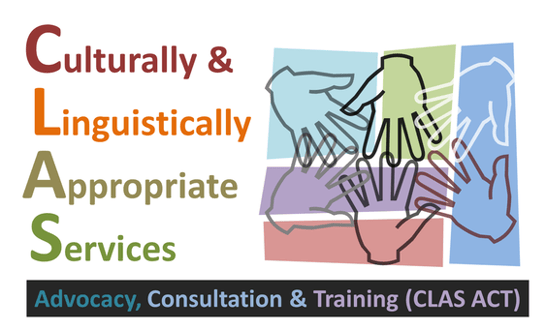
Image Source: CLAS Advocacy, Consultation, and Training Project at NICOS Chinese Health Coalition.
Health systems are working to increase the Diversity of their leadership team, board and staff. Each hospital’s workforce should represent the diverse populations of the community they serve. Many hospital teams are building a culture of Diversity and Inclusion (D&I) to better engage all employees and provide high-quality, equitable care for all patients.
Part of building a culture that is mindful of D&I is being aware of the National CLAS (Culturally and Linguistically Appropriate Services) Standards. As stated in the case for National CLAS Standards “Culturally and linguistically appropriate services are increasingly recognized as effective in improving the quality of care and services. By providing a structure to implement culturally and linguistically appropriate services, the National CLAS Standards will improve an organization’s ability to address health care disparities.”
A Diversity Best Practice report says, Minorities continue to experience discrimination in healthcare and have worse health outcomes than white individuals. Cultural differences, language barriers, and high rates of unemployment and poverty have created major disparities in health status and health outcomes for minorities and other marginalized groups. Lack of diversity in the healthcare workforce, poor provider-to-patient communication, and health literacy challenges further contribute to the problem.
The National (CLAS) Standards is a great strategy intended to advance health equity, improve quality, and help eliminate healthcare disparities, by providing a set of 15 action steps for healthcare organizations to implement.
The National CLAS Standards are as follows:
Principal Standard
- Provide effective, equitable, understandable, and respectful quality care and services that are responsive to diverse cultural health beliefs and practices, preferred languages, health literacy, and other communication needs.
Governance, Leadership and Workforce
- Advance and sustain organizational governance and leadership that promotes CLAS and health equity through policy, practices, and allocated resources.
- Recruit, promote, and support a culturally and linguistically diverse governance, leadership, and workforce that are responsive to the population in the service area.
- Educate and train governance, leadership, and workforce in culturally and linguistically appropriate policies and practices on an ongoing basis.
Communication and Language Assistance
- Offer language assistance to individuals who have limited English proficiency and/or other communication needs, at no cost to them, to facilitate timely access to all health care and services.
- Inform all individuals of the availability of language assistance services clearly and in their preferred language, verbally and in writing.
- Ensure the competence of individuals providing language assistance, recognizing that the use of untrained individuals and/or minors as interpreters should be avoided.
- Provide easy-to-understand print and multimedia materials and signage in the languages commonly used by the populations in the service area.
Engagement, Continuous Improvement, and Accountability
- Establish culturally and linguistically appropriate goals, policies, and management accountability, and infuse them throughout the organization's planning and operations.
- Conduct ongoing assessments of the organization's CLAS-related activities and integrate CLAS-related measures into measurement and continuous quality improvement activities.
- Collect and maintain accurate and reliable demographic data to monitor and evaluate the impact of CLAS on health equity and outcomes and to inform service delivery.
- Conduct regular assessments of community health assets and needs and use the results to plan and implement services that respond to the cultural and linguistic diversity of populations in the service area.
- Partner with the community to design, implement, and evaluate policies, practices, and services to ensure cultural and linguistic appropriateness.
- Create conflict and grievance resolution processes that are culturally and linguistically appropriate to identify, prevent, and resolve conflicts or complaints.
- Communicate the organization's progress in implementing and sustaining CLAS to all stakeholders, constituents, and the general public.

